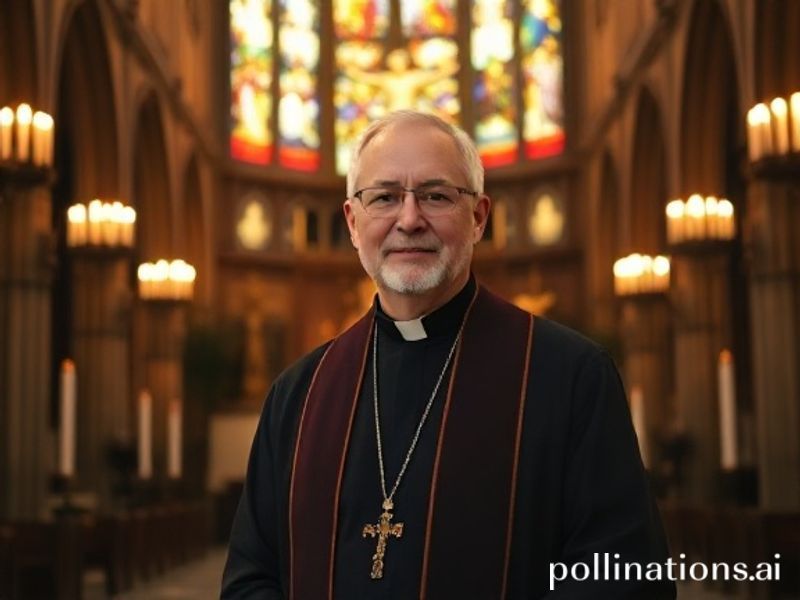Bishop Barron’s Digital Empire: How a California Preacher Built Catholicism’s Answer to Netflix
**The Bishop Who Streams Salvation: Robert Barron’s Digital Empire and the Vatican’s Netflix Strategy**
ROME—While Silicon Valley titans race to colonize Mars and Wall Street wizards invent new ways to lose other people’s money, Bishop Robert Barron has quietly built something far more ambitious: a global Catholic media empire that makes Netflix’s content library look like a parish newsletter. The auxiliary bishop of Los Angeles, whose Word on Fire ministry reaches 3.2 million YouTube subscribers across six continents, has essentially become the Vatican’s answer to Disney+, only with more incense and fewer Marvel superheroes.
From his production studio in Santa Barbara—strategically located between the tech bros of San Francisco and the avocado toast billionaires of Los Angeles—Barron has achieved what centuries of missionaries couldn’t: making Catholic theology binge-worthy for a generation that considers 280 characters an intellectual marathon. His videos, slicker than a Goldman Sachs presentation and more polished than a K-pop music video, explain Thomas Aquinas between drone shots of Gothic cathedrals while algorithms whisper sweet nothings to viewers from Manila to Munich.
The international implications are deliciously ironic. Here we have an American bishop using South Korean technology platforms to distribute medieval philosophy to Nigerian entrepreneurs watching on Chinese-made smartphones while commuting through Lagos traffic. It’s globalization wearing a Roman collar, served with a side of existential dread about whether our souls have WiFi.
In the Philippines, where Catholicism meets karaoke culture, Barron’s videos have spawned viewing parties that would make Netflix executives weep with envy. Filipino call center workers—professional insomniacs who’ve seen every Western midnight from the wrong side of a headset—now debate transubstantiation during their 3 AM breaks, proving that late-stage capitalism can accommodate both salvation and sales targets.
Meanwhile, in secular Europe, where church attendance rivals that of fax machine conventions, Barron’s digital evangelism has created what Vatican watchers call “the Netflix effect”: lapsed Catholics who haven’t seen the inside of a confessional since the Berlin Wall fell are suddenly binge-watching homilies on their lunch breaks in Stockholm. It’s religious re-engagement through the same algorithmic manipulation that convinced them to buy that air fryer they’ll never use.
The financial model would make venture capitalists blush. While traditional parishes struggle to keep the lights on, Barron’s operation runs on a sophisticated patronage system that would make Renaissance popes green with envy—or perhaps just green with the usual envy. Wealthy Catholics from Texas oil fortunes to Hong Kong real estate dynasties underwrite productions that cost more than some countries’ GDPs, all to ensure that 4K drone footage of Chartres Cathedral reaches teenagers who think “medieval” means “before TikTok.”
But perhaps the most subversive aspect is how Barron has weaponized the very tools of secular distraction for transcendental purposes. While other influencers sell detox teas and questionable cryptocurrency schemes, he’s selling eternal salvation with production values that would make HBO executives consider conversion. His recent series on “The Seven Deadly Sins” garnered more views in one week than the entire population of Ireland, suggesting that humanity’s appetite for moral instruction remains remarkably robust, provided it’s properly lit and has a good soundtrack.
As traditional religious institutions worldwide grapple with empty pews and scandal-fatigued congregations, Barron’s digital cathedral suggests a future where faith goes viral faster than COVID variants. Whether this represents the salvation of organized religion or its final transformation into just another content vertical remains an open theological question.
In the meantime, somewhere in Seoul, a teenager who just discovered Augustine’s “Confessions” through auto-play wonders if the algorithm knew something about his soul that even his parents didn’t. Bishop Barron, no doubt, would call that grace. The rest of us might just call it excellent SEO.







